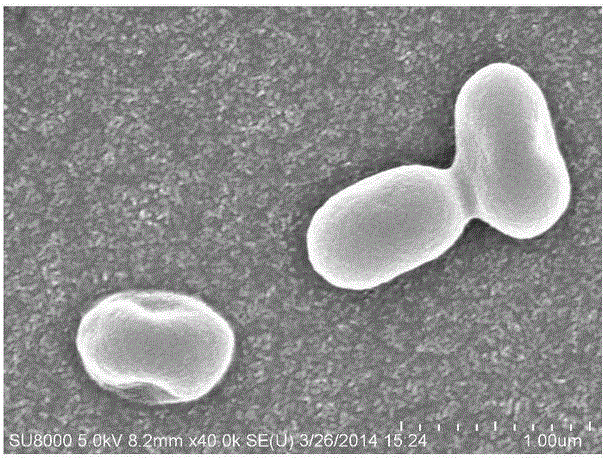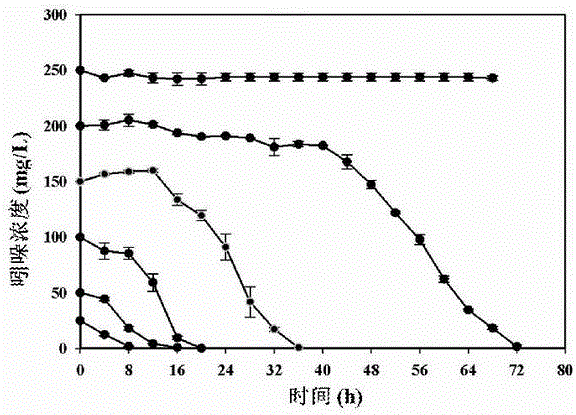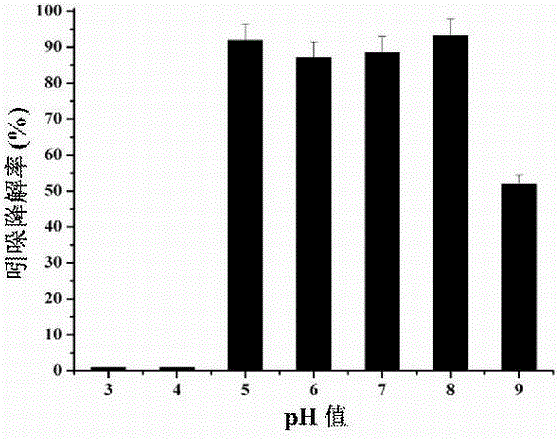A strain of copper greedy bacteria for aerobic degradation of indole and its application
A technology of copper greedy bacteria and indole, which is applied in the field of copper greedy bacteria, can solve the problem of limited research on the genus
- Summary
- Abstract
- Description
- Claims
- Application Information
AI Technical Summary
Problems solved by technology
Method used
Image
Examples
Embodiment 1
[0019] Example 1 : Acquisition of Copper greedy bacteria strains
[0020] The soil samples from the seaside of Heishijiao, Dalian were diluted and plated, and the samples were spread in 1 / 10 LB (NaCl 1 g / L, peptone 1 g / L, yeast powder 0.5 g / L, pH=7, ind Indole 100 mg / L) plate, cultivated at 30°C, picked a single colony and used inorganic salt medium ((NH 4 ) 2 SO 4 2.0 g / L, KH 2 PO 4 2.0 g / L, Na 2 HPO 4 •12H 2 O 3.28 g / L, FeCl 3 0.00025 g / L, indole 100 mg / L) culture, 30 ℃, pH 7.0, 150 rpm to obtain the bacterial liquid. The cell morphology of IDO is short rod-shaped, with a size of about 0.5 μm, such as figure 1 .
Embodiment 2
[0021] Example 2 : 16S rRNA molecular identification of strains
[0022] Pick a single colony grown on an inorganic salt solid medium plate and dissolve it in 10 µL of sterilized water, denature at 99°C and centrifuge to take the supernatant as a template for PCR amplification reaction. Use TaKaRa 16S rDNA Bacterial Identification PCR Kit with Forward primer / Reverse primer 2 as primers to amplify the target fragment. The total volume of the PCR reaction system is 50 µL: PCR Premix 25 µL, Forward Primer 0.5 µL, Reverse Primer 20.5 µL, template DNA 5 µL, sterile ultrapure water 19 µL. The PCR reaction conditions were: pre-denaturation at 94°C for 5 min, after 30 cycles, including denaturation at 94°C for 1 min, annealing at 55°C for 1 min, extension at 72°C for 1.5 min, after 30 cycles, extension at 72°C for 5 min, 5 μL of PCR products were subjected to 1% agarose gel electrophoresis, and UV detection after EB staining. Use TaKaRa Agarose Gel DNA Purification Kit Ver. 2.0 ...
Embodiment 3
[0025] Example 3 : Determination of Broad-spectrum Substrate of IDO of Copper greedy bacteria
[0026] Utilizing the bacterial solution in Example 1, using inorganic salt medium for cultivation, 5% inoculum, specifically investigated the growth of bacterial strain IDO with multiple compounds as the only carbon source, including benzoic acid, tryptophan, phenol, and catechol , salicylic acid, gentisic acid, indole, isatin, quinoline, pyridine, naphthalene, phenanthrene, biphenyl, etc., the concentration of each compound is 50 mg / L. Table 1 shows the effect of IDO of C. spp. in the medium with different compounds as the only carbon source.
[0027] Table 1 Investigation on the substrate broad-spectrum of IDO of C.
[0028] substance result substance result benzoic acid + 3-Methylindole - Tryptophan + 2-Methylindole - phenol + indole acetic acid - Catechol + quinoline - salicylic acid + pyridine - Gentisic aci...
PUM
 Login to View More
Login to View More Abstract
Description
Claims
Application Information
 Login to View More
Login to View More - R&D
- Intellectual Property
- Life Sciences
- Materials
- Tech Scout
- Unparalleled Data Quality
- Higher Quality Content
- 60% Fewer Hallucinations
Browse by: Latest US Patents, China's latest patents, Technical Efficacy Thesaurus, Application Domain, Technology Topic, Popular Technical Reports.
© 2025 PatSnap. All rights reserved.Legal|Privacy policy|Modern Slavery Act Transparency Statement|Sitemap|About US| Contact US: help@patsnap.com



